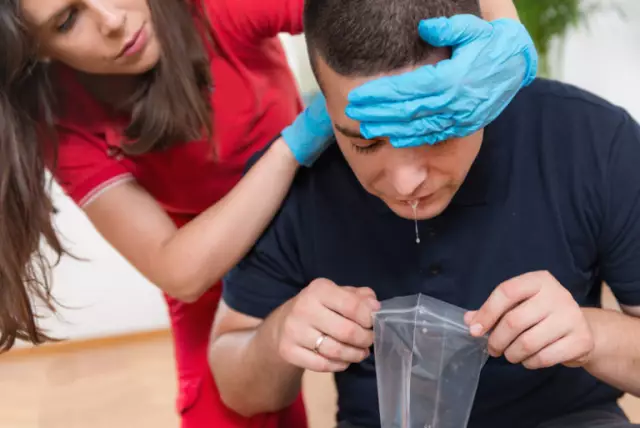- Author Rachel Wainwright [email protected].
- Public 2023-12-15 07:39.
- Last modified 2025-11-02 20:14.
Ammonia poisoning
Ammonia is a gaseous compound with a pungent specific odor, the molecule of which consists of hydrogen and nitrogen atoms. It is one of the most widely used substances in the chemical industry, necessary in the production of dyes, nitric acid, nitrogenous fertilizers. Ammonia is also used in everyday life in the form of aqueous solutions with a concentration of 10-25%, which are called ammonia.

Source: sigmatec.ru
How does ammonia poisoning happen?
The maximum permissible concentration of ammonia in the air is 20 mg per 1 m 3. If it is higher, when such air is inhaled, ammonia poisoning develops.
The release of ammonia into the air, which increases its concentration to levels that can cause poisoning, occur as a result of accidents in chemical plants. Also, ammonia poisoning occurs when working in sewage and treatment pits without the use of personal protective equipment.
When ammonia enters the bloodstream, it causes a sharp expansion of blood vessels and, as a result, a drop in blood pressure, up to the development of collapse. In addition, ammonia has a pronounced irritant effect on the skin, mucous membranes of the respiratory tract, eyes, contact with it causes a chemical burn.
Poisoning symptoms
Symptoms of ammonia poisoning appear almost instantly after exposure. These include:
- lacrimation, photophobia, blepharospasm;
- profuse discharge of fluid from the nose (rhinorrhea), increased salivation;
- hyperemia of the mucous membranes;
- hoarseness, soreness and a sore throat;
- dry paroxysmal cough;
- pain and tightness in the chest;
- breathing disorders;
- intense headache;
- dyspeptic disorders (heartburn, abdominal pain, nausea, vomiting, diarrhea);
- the formation of blisters on the skin, which later open up and specific crusts appear in their place.
In case of severe ammonia poisoning, the victims develop significant burns of the respiratory tract, which leads to the development of pneumonia and pulmonary edema.

Source: depositphotos.com
First aid for ammonia poisoning
At the first signs of ammonia poisoning, the victim should leave the place of its high concentration as soon as possible. If the victim is unconscious or disoriented, the rescuer, before entering the emergency area, should cover his mouth and nose with a gauze bandage moistened with 5% citric acid solution (1 teaspoon of citric acid powder diluted in ½ glass of warm water). Then call an ambulance team and start providing first aid.
- Provide fresh air.
- Rinse the skin with running water or 5% citric acid solution.
- Rinse your eyes thoroughly with running water, then drip 1-2 drops of dicaine solution and apply a cotton-gauze bandage on the eyelids.
- Rinse the mouth, nose, throat for 15 minutes with a 5% citric acid solution.
- If breathing stops, carry out artificial ventilation of the lungs to the victim by mouth-to-mouth or mouth-to-nose method before the arrival of an ambulance.
When is medical attention needed?
In case of ammonia poisoning, medical attention is always necessary, the prognosis largely depends on the timeliness of the treatment begun.
The victims are shown hospitalization in the toxicology department. During the day, they must observe strict bed rest, even if the symptoms of intoxication are not pronounced.
Treatment is symptomatic. If laryngospasm is severe, a tracheostomy may be required. According to the general rules, skin and corneal burns are treated. For the prevention and treatment of pneumonia, broad-spectrum antibiotics are indicated.
Possible consequences
Ammonia poisoning has a serious prognosis. Complications include:
- lesions of the nervous system: tremors of the limbs, dizziness, skin sensitivity and balance disorders, tics, disorientation, decreased intelligence, amnesia;
- hearing loss up to the onset of persistent deafness;
- decrease in visual acuity of varying severity, up to its complete loss.
Prevention
In the chemical industry, all safety requirements must be observed with the utmost care. To prevent ammonia poisoning when working with it, you should use personal protective equipment:
- latex gloves;
- rubber boots;
- chemical protection suit;
- respirators or gas masks.
In the event of an emergency, cover your nose and mouth with a damp cloth and immediately leave the contaminated area, for example, go down to the lower floors of the building or into the basement. The fact is that ammonia has a relative density less than air and therefore rises up. In an open space, it is also necessary to cover your face with a piece of damp cloth and take a quick step to a safe distance.
YouTube video related to the article:

Elena Minkina Doctor anesthesiologist-resuscitator About the author
Education: graduated from the Tashkent State Medical Institute, specializing in general medicine in 1991. Repeatedly passed refresher courses.
Work experience: anesthesiologist-resuscitator of the city maternity complex, resuscitator of the hemodialysis department.
The information is generalized and provided for informational purposes only. At the first sign of illness, see your doctor. Self-medication is hazardous to health!






